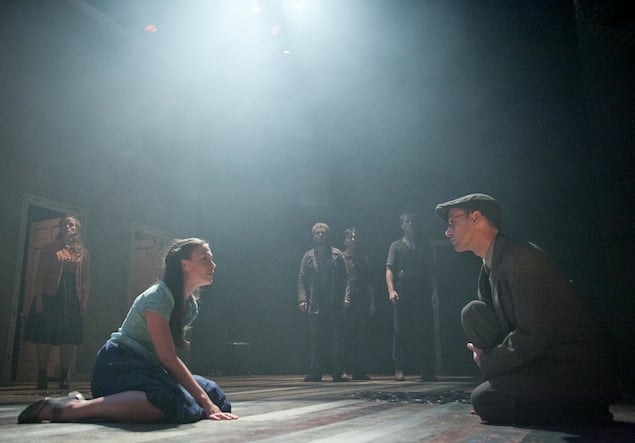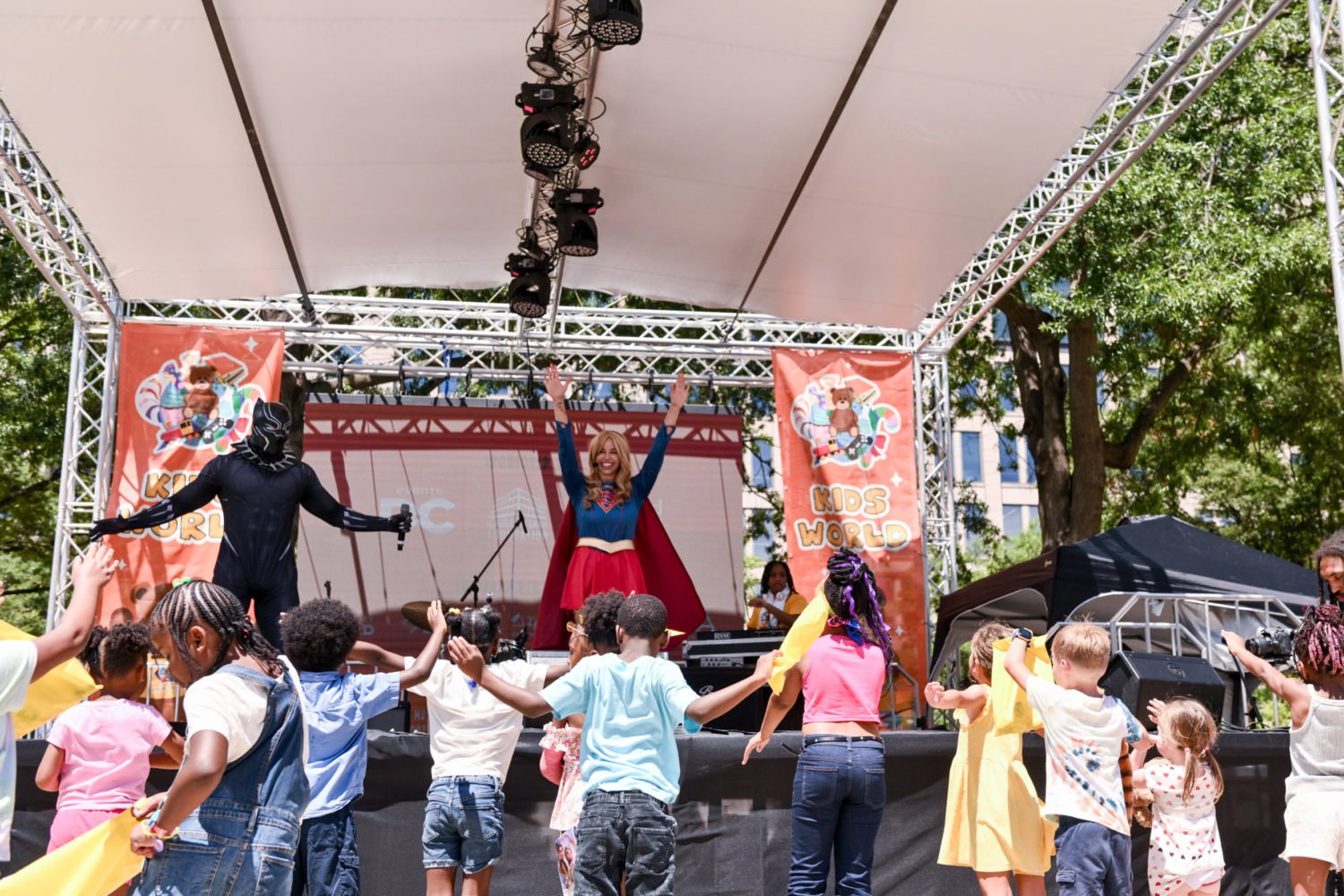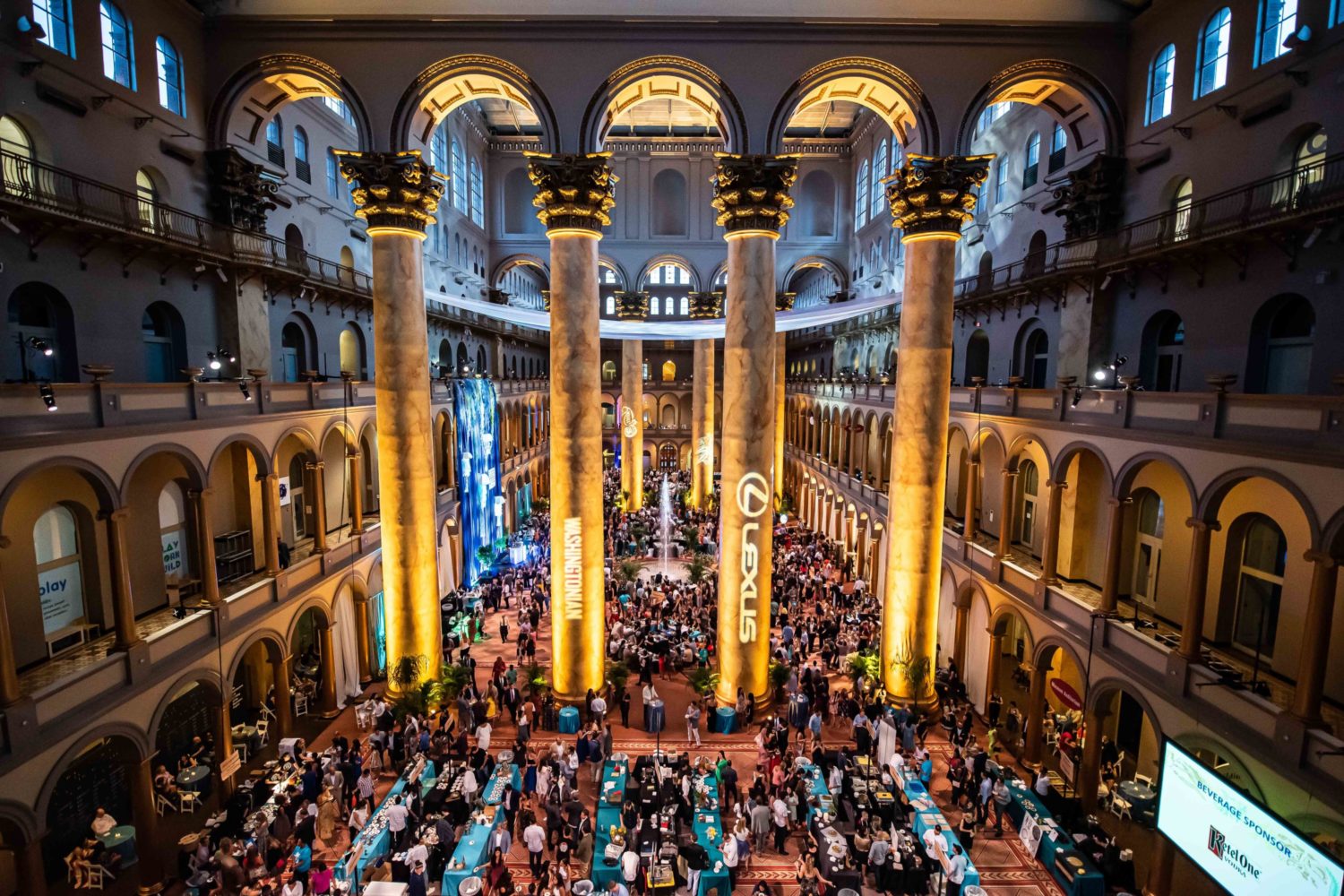
Early on in
Our Class, the harrowing epic by
Tadeusz Slobodzianek currently playing at Theater J, young Jewish schoolgirl Dora (Laura C. Harris) receives a Valentine from her Catholic classmate, Rysiek (Harlan Wolk). He painstakingly crafts it out of pink paper, cuts it into the shape of a heart,
and sprays it with perfume before stashing it in her bag (the missive’s resemblance
to Elle Woods’s resume is one of the play’s
few moments of levity). Only another classmate intercepts it first, and Rysiek is
cruelly mocked. “I felt bad for him,” Dora tells the audience, “but what could I do?”
This refrain of “what could I have done?” is one that recurs with heartbreaking frequency
during the show, which tells the story—based on true events—of ten Polish classmates
growing up during the rise of Hitler, the Soviet occupation, and World War II. But
the villains of the piece aren’t the mustache-twirling, almost comically menacing
Nazis so prevalent in any art that deals with the period. Instead they’re the basest
elements of each of the ten young characters, and the inexplicable prejudices within
them that lead to acts of unspeakable horror. If blood is thicker than water, Slobodzianek
seems to suggest, the bonds of childhood friendship are more like cobwebs—easy to
sever, but impossible to shake off altogether.
Director
Derek Goldman deserves kudos for the cast he’s assembled, because the ten players, most of whom
remain onstage for much of the show, are exceptionally strong both during individual
scenes and as an ensemble. The play (the English translation of which, by Ryan Craig,
ran to critical acclaim at London’s National Theatre in 2009) is structured much like
a school day, divided into 14 different “lessons,” or periods of history. Amid
Misha Kachman’s deceptively simple set of pastel-painted floorboards, wooden chairs, and a flimsy-looking
table, we see the ten friends go from childhood all the way to death. But most of
the show is set during a period of history Poland would rather forget—and did, for
many years, until a documentary and a book brought them back into the light. In 1941,
the entire Jewish population of Jedwabne, a small town close to the border of what’s
now Belarus, was massacred in a single day—not by the Nazis, as the story went for
so many years, but by the town’s own Catholic residents. “We knew them,” says one
character during the carnage. “They were our neighbors.”
Neither Slobodzianek nor Goldman seems to be overly interested in what motivates people
to commit such awful acts, although it’s made clear that the Catholic townsfolk plundered
gold, money, and property from the people they murdered. Instead, the show asks again
and again how people could simply stand by powerlessly and watch. None of the characters
seems to be particularly equipped with a strong moral core, with the possible exception
of Abram (Sasha Olinick), the lone escapee sent to live in America before the pogrom takes place. Instead,
when retribution does occur, it’s largely because the wounded are hungry for revenge,
making it less than satisfying to observe.
At more than three hours, this is a play of epic proportions, though with the exception
of a few final scenes it rarely drags. Goldman finds a balance between tearing at
our heartstrings—as he does in harrowing scenes of rape and violence, brilliantly
choreographed by
Emma Jaster and fight choreographer
Joe Isenberg—and making us laugh through the sheer absurdity of life and death. “Thou shalt not
kill,” says Heniek (Alexander Strain), as he’s roughly drilling the catechism into Rachelka (Dana Levanosky), the town’s lone Jewish survivor, who’s forced to convert to Catholocism to survive.
Bearing in mind that Heniek helped set ablaze a barn full of women and children just
a few minutes earlier, it’s almost grotesquely comic.
This is a deeply moving show, and one that succeeds in painting a haggard portrait
of humanity at its lowest, but Goldman also punctuates each lesson by bringing the
classmates together in song. The musical interludes are profoundly beautiful but also
a reminder that even the cruelest wrongdoers were innocent children once. When characters
die, we see them remove their shoes before retiring to sit quietly at the back of
the stage, a watchful, if powerless, presence. The use of shoes to represent souls—something
that’s done equally powerfully at the Holocaust Museum in DC—is quietly humanizing,
and something of an antidote to the pitiless degradation the show takes as its sad
but worthy subject.
Our Class
is at Theater J through November 4. Running time is about three hours, with one 15-minute
intermission. Tickets ($45 to $60) are available via Theater J’s website.

















